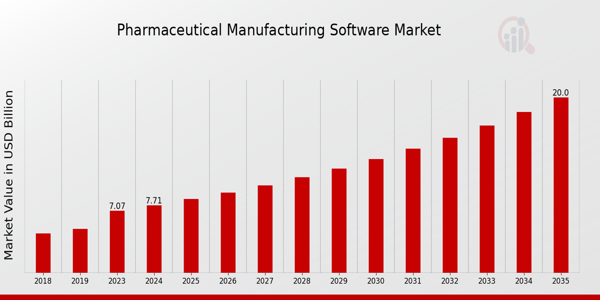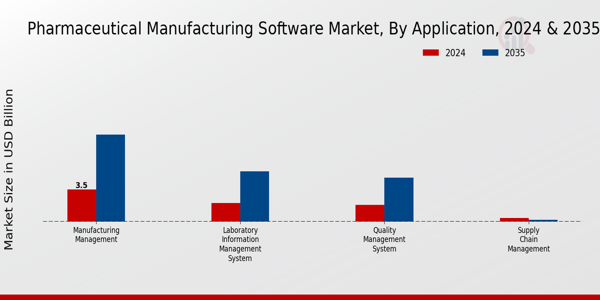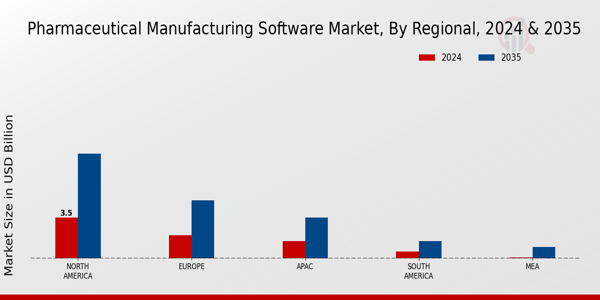Pharmaceutical Manufacturing Software Market Overview
Pharmaceutical Manufacturing Software Market Size was estimated at 7.07 (USD Billion) in 2023.The Pharmaceutical Manufacturing Software Market Industry is expected to grow from 7.71(USD Billion) in 2024 to 20.0 (USD Billion) by 2035. The Pharmaceutical Manufacturing Software Market CAGR (growth rate) is expected to be around 9.05% during the forecast period (2025 - 2035).

Source: Primary Research, Secondary Research, Market Research Future Database and Analyst Review
Key Pharmaceutical Manufacturing Software Market Trends Highlighted
The Global Pharmaceutical Manufacturing Software Market is influenced by several key market drivers that shape its development. Increasing regulatory requirements and the demand for compliance with good manufacturing practices are pushing pharmaceutical companies to adopt software solutions. This adoption is further fueled by the growing need to enhance operational efficiency and reduce production costs. Digital transformation across the industry emphasizes the integration of advanced technologies such as cloud computing and artificial intelligence, allowing manufacturers to streamline processes and improve quality control.
Opportunities in this evolving market are significant.With the ongoing trend toward personalized medicine and biopharmaceuticals, there is a rising need for tailored manufacturing solutions that can adapt to unique product requirements. Companies can explore collaborations with software providers to create customized applications that cater to specific operational challenges. Emerging markets also present a growing demand for advanced software solutions as local manufacturers aim to enhance their capabilities to compete globally. Recent times have seen a shift toward software that facilitates data analytics and real-time monitoring of production processes.
The use of IoT devices and interconnected systems is becoming more prevalent, enabling manufacturers to gather and analyze data more effectively, leading to better decision-making.Moreover, there is an increasing focus on sustainability within pharmaceutical manufacturing, prompting the development of software that helps track environmental impact and compliance. As the industry evolves, the integration of machine learning into manufacturing processes is gaining traction, offering predictive analytics that can enhance production efficiency and reduce downtime. The overall landscape indicates a dynamic future for pharmaceutical manufacturing software, driven by technological advancements and the ongoing need for compliance and efficiency.
Pharmaceutical Manufacturing Software Market Drivers
Increasing Demand for Automated Solutions
The Global Pharmaceutical Manufacturing Software Market Industry is witnessing a substantial shift towards automation in production processes. Manufacturers are increasingly adopting automated systems to enhance productivity and ensure high-quality output. These automated solutions help maintain precision, reduce human errors and optimize resource utilization. As the complexity of pharmaceutical products grows and regulatory compliance becomes stringent, the integration of advanced software solutions in the manufacturing process is crucial.With growing concerns about cost efficiency and product consistency, more companies are looking to implement software that can provide real-time data analysis and facilitate better decision-making.
Furthermore, automation not only streamlines operations but also aids in the comprehensive tracking of production metrics. This shift drives growth in the Global Pharmaceutical Manufacturing Software Market as companies seek to invest in innovative technologies that support lean manufacturing principles, ultimately leading to improved operational efficiency and a reduction in time-to-market for new products.
Regulatory Compliance and Quality Assurance
As the pharmaceutical industry is heavily regulated, ensuring compliance with industry standards and regulations is crucial for manufacturers. The Global Pharmaceutical Manufacturing Software Market Industry is driven by the need for software solutions that facilitate adherence to Good Manufacturing Practices (GMP) and other regulatory requirements. These software systems help companies maintain meticulous records, which is essential for audits and inspections.Understanding compliance software enables pharmaceutical manufacturers to mitigate their risks and ensure product safety and efficacy. This, in turn, helps retain their customers and maintain their market share.
Technological Advancements and Integration
The rapid advancements in technology, such as artificial intelligence, machine learning, and IoT, are transforming the Global Pharmaceutical Manufacturing Software Market Industry. These technologies enable enhanced data analysis, predictive maintenance, and improved process control, which are essential for optimizing manufacturing operations. The integration of these technologies into existing manufacturing processes allows for greater flexibility and scalability, empowering manufacturers to respond swiftly to market changes and consumer demands.Additionally, as companies strive for digital transformation, the adoption of these cutting-edge technologies is expected to drive growth and innovation in the pharmaceutical sector.
Pharmaceutical Manufacturing Software Market Segment Insights
Pharmaceutical Manufacturing Software Market Application Insights
The Global Pharmaceutical Manufacturing Software Market is characterized by a diverse Application segment, which is instrumental in enhancing operational efficiency and ensuring regulatory compliance within the pharmaceutical industry. In 2024, the market is projected to generate a revenue of 7.71 USD Billion, underscoring a robust demand for software solutions that cater to varied applications in pharmaceutical manufacturing.
Within this segment, Manufacturing Management stands out with a valuation of 3.5 USD Billion in 2024 and is expected to grow to 9.5 USD Billion by 2035.This significant growth indicates its vital role in streamlining production processes, optimizing resources, and facilitating compliance with manufacturing regulations, thereby dominating the application space.
The Laboratory Information Management System, valued at 2.0 USD Billion in 2024, is also a crucial component, providing essential support in sample tracking, data management, and quality control, with a forecasted increase to 5.5 USD Billion by 2035 due to the continual advancements in laboratory technology and increased R activities.The Quality Management System, valued at 1.8 USD Billion in 2024, plays a significant role in maintaining product quality and adhering to regulatory standards, with projections reaching 4.8 USD Billion by 2035, reflecting its importance in improving product reliability and consumer safety.
Meanwhile, the Supply Chain Management segment, although smaller with a valuation of 0.41 USD Billion in 2024, emphasizes the necessity of logistics, inventory control and supplier collaboration. This segment is expected to experience fluctuations in its growth trajectory, reflecting a challenging yet crucial aspect of pharmaceutical operations.
Collectively, the Global Pharmaceutical Manufacturing Software Market segmentation highlights a landscape where Manufacturing Management takes a majority holding in revenue generation, while Laboratory Information Management System and Quality Management System also contribute significantly to market dynamics, showcasing the growing importance of software solutions designed to optimize pharmaceutical manufacturing processes.
The ongoing trends in digital transformation, regulatory changes, and the rising emphasis on quality assurance and supply chain efficiency present substantial growth opportunities in this market segment, further encouraging investments and innovations in software solutions tailored for pharmaceutical manufacturing applications.As the industry navigates through challenges such as regulatory compliance and the need for operational excellence, the applications of software solutions become critical in fostering enhanced productivity and reducing costs across the board.

Source: Primary Research, Secondary Research, Market Research Future Database and Analyst Review
Pharmaceutical Manufacturing Software Market Deployment Type Insights
The Global Pharmaceutical Manufacturing Software Market encompasses various Deployment Type options that cater to different operational needs within the industry. Among the deployment types, Cloud-Based solutions have gained significant traction due to their scalability and flexibility, allowing organizations to easily manage costs and infrastructure. On-premise systems, while traditionally preferred for their control and security, are increasingly complemented by Hybrid models, which combine the reliability of local installations with the advantages of cloud technology.These deployment types are essential for accommodating diverse business requirements, enhancing data accessibility, and ensuring compliance with industry standards.
As pharmaceutical companies seek efficient solutions, the Global Pharmaceutical Manufacturing Software Market revenue is set to increase, with ongoing digital transformation presenting ample opportunities for growth. Overall, these segments play a crucial role in driving operational efficiency and supporting the evolving landscape of pharmaceutical manufacturing.
Pharmaceutical Manufacturing Software Market End User Insights
This segment includes Pharmaceutical Companies, Contract Manufacturing Organizations (CMOs), Biotechnology Companies, and Research Institutions, each playing a vital role in the overall industry. Pharmaceutical Companies dominate this market segment due to their extensive operations and need for efficient manufacturing processes. Similarly, CMOs are important as they provide essential outsourcing services, thus fulfilling increasing production demands.Biotechnology Companies leverage advanced software solutions for innovative drug development, while Research Institutions utilize these tools to enhance their research capabilities. As the market continues to evolve, trends such as digital transformation, increased collaboration, and regulatory compliance remain pivotal.
These drivers, along with the rising demand for biologics and personalized medicine, present robust opportunities within the Global Pharmaceutical Manufacturing Software Market. A focus on streamlining operations and enhancing productivity will be critical for all end users to stay competitive amid the challenges faced in the rapidly changing pharmaceutical landscape.
Pharmaceutical Manufacturing Software Market Functionality Insights
The Global Pharmaceutical Manufacturing Software Market reflects the growing emphasis on effective functionality. Within this market landscape, elements such as Inventory Management, Production Planning, Regulatory Compliance, and Document Management play a crucial role in enhancing operational efficiency. Inventory Management has become increasingly significant, as it allows companies to maintain optimal stock levels and reduce waste, thereby optimizing costs. Production Planning is likewise essential, ensuring that manufacturing processes remain streamlined and aligned with demand.Regulatory Compliance is a key consideration, as it helps organizations adhere to stringent industry standards, improving safety and product quality.
Document Management systems dominate this segment by facilitating better documentation practices and audit readiness. These functionalities collectively contribute to effective Pharmaceutical Manufacturing Software Market revenue, driven by industry trends that prioritize digital transformation and increased regulatory scrutiny. Understanding the intricacies of these functionalities reveals the dynamics of the Global Pharmaceutical Manufacturing Software Market segmentation, providing valuable insights into market growth patterns and strategic opportunities.
Pharmaceutical Manufacturing Software Market Regional Insights
The Global Pharmaceutical Manufacturing Software Market is projected to witness significant growth across various regions, with North America holding a majority share of the market, valued at 3.5 USD Billion in 2024 and anticipated to rise to 9.0 USD Billion by 2035. This dominance is primarily due to advanced technological infrastructure and a high concentration of key pharmaceutical companies in the region.
Europe follows as a significant player, with a market valuation of 2.0 USD Billion in 2024, expected to reach 5.0 USD Billion by 2035, driven by strict regulatory compliance and growing healthcare demands.The Asia-Pacific (APAC) region, valued at 1.5 USD Billion in 2024, is expected to grow to 3.5 USD Billion by 2035, reflecting rapid industrialization and rising investments in the pharmaceutical sector, showcasing its strategic importance in the market.
South America and MEA represent comparatively smaller segments, with valuations of 0.6 USD Billion and 0.11 USD Billion in 2024 respectively, but are positioned for growth driven by increasing healthcare investments and technological adoption. The overall market trends indicate a robust opportunity for growth across all these regions, facilitated by advancements in pharmaceutical manufacturing technologies and rising global health challenges.

Source: Primary Research, Secondary Research, Market Research Future Database and Analyst Review
Pharmaceutical Manufacturing Software Market Key Players and Competitive Insights
The Global Pharmaceutical Manufacturing Software Market has become a vital component in the efficiency and productivity of modern pharmaceutical operations. With the increasing need for regulatory compliance, streamlined manufacturing processes, and enhanced quality control, various software solutions have emerged to meet these demands. The competitive landscape of this market features a range of players that offer solutions tailored to improve manufacturing operations, from inventory management to production scheduling and analysis.
As pharmaceutical companies face unique challenges such as stringent regulations and the necessity for rapid adaptation to changing market conditions, the software market flourishes with innovative offerings that provide significant competitive advantages. These advancements foster a dynamic environment where companies are continuously challenged to enhance their capabilities, adopt new technologies, and optimize operations to maximize productivity while ensuring compliance.Paragon Solutions stands out in the Global Pharmaceutical Manufacturing Software Market with a distinct focus on providing industry-specific solutions that address the unique needs of the pharmaceutical sector.
Their software offerings emphasize user-friendly interfaces combined with robust functionalities that cater to the complexities associated with pharmaceutical production, including regulatory adherence and quality assurance processes. Paragon Solutions has established a strong market presence through innovative approaches that enhance operational workflows, improve data management, and facilitate compliance with regulatory standards. The company’s dedication to client satisfaction is reflected in its tailored services that support diverse manufacturing environments, helping clients achieve greater efficiency and responsiveness in their operations.
This strategic positioning within the market underscores Paragon Solutions' strengths in providing effective software solutions essential for modern pharmaceutical manufacturing.SAP is another key player in the Global Pharmaceutical Manufacturing Software Market, renowned for its comprehensive suite of enterprise resource planning (ERP) solutions that are extensively utilized by companies in the life sciences sector. SAP's software is designed to seamlessly integrate various functions, thereby supporting end-to-end manufacturing processes. The company's offerings are characterized by advanced analytics, enabling manufacturers to make informed decisions based on real-time data.
With long-established reliability and deep industry expertise, SAP equips pharmaceutical companies with tools that enhance operational efficiency, facilitate compliance, and improve overall performance. Its strong market presence is supported by continuous innovation, focusing on integrating cloud technologies, big data, and IoT capabilities that align with current industry trends. By providing scalable solutions suitable for companies of varying sizes, SAP maintains a competitive edge in this evolving landscape, continuously adapting to meet the dynamic needs of pharmaceutical manufacturing.
Key Companies in the Pharmaceutical Manufacturing Software Market Include
- Paragon Solutions
- SAP
- MasterControl
- Veeva Systems
- Quality Systems
- Plex Systems
- Siemens
- IQVIA
- Medidata Solutions
- Syspro
- Aptean
- Dassault Systemes
- Oracle
- TraceLink
- FlexiHub
Pharmaceutical Manufacturing Software Market Industry Developments
Recent developments in the Global Pharmaceutical Manufacturing Software Market highlight significant advancements driven by increasing automation and regulatory compliance demands. Companies like SAP and Oracle are focusing on enhancing their software solutions to streamline manufacturing processes, responding to the industry's growing emphasis on efficiency. Furthermore, Veeva Systems and MasterControl are innovating with cloud-based solutions that facilitate real-time monitoring and better data management, catering to the needs of biotechnology firms. The market has also seen a notable merger activity, with Paragon Solutions and Quality Systems exploring synergies to boost their digital offerings, enhancing operational scalability.
Reports suggest that Siemens is actively acquiring tech startups to bolster its pharmaceutical software capabilities, while IQVIA continues to collaborate with academic institutions to refine analytics tools for drug development. Overall, the valuation of companies like Medidata Solutions and Plex Systems is on the rise, reflecting strong investor interest and a robust appetite for technology that addresses regulatory challenges while optimizing production. As companies strive to integrate better data-driven decision-making processes, the momentum in this sector is expected to accelerate, prompting ongoing investment and innovation.
Pharmaceutical Manufacturing Software Market Segmentation Insights
Pharmaceutical Manufacturing Software Market Application Outlook
- Manufacturing Management
- Laboratory Information Management System
- Quality Management System
- Supply Chain Management
Pharmaceutical Manufacturing Software Market Deployment Type Outlook
- On-Premise
- Cloud-Based
- Hybrid
Pharmaceutical Manufacturing Software Marke tEnd User Outlook
- Pharmaceutical Companies
- Contract Manufacturing Organizations
- Biotechnology Companies
- Research Institutions
Pharmaceutical Manufacturing Software Market Functionality Outlook
- Inventory Management
- Production Planning
- Regulatory Compliance
- Document Management
Pharmaceutical Manufacturing Software Market Regional Outlook
- North America
- Europe
- South America
- Asia Pacific
- Middle East and Africa
Report Scope:
| Report Attribute/Metric Source |
Details |
| MARKET SIZE 2023 |
7.07(USD Billion) |
| MARKET SIZE 2024 |
7.71(USD Billion) |
| MARKET SIZE 2035 |
20.0(USD Billion) |
| COMPOUND ANNUAL GROWTH RATE (CAGR) |
9.05% (2025 - 2035) |
| REPORT COVERAGE |
Revenue Forecast, Competitive Landscape, Growth Factors, and Trends |
| BASE YEAR |
2024 |
| MARKET FORECAST PERIOD |
2025 - 2035 |
| HISTORICAL DATA |
2019 - 2024 |
| MARKET FORECAST UNITS |
USD Billion |
| KEY COMPANIES PROFILED |
Paragon Solutions, SAP, MasterControl, Veeva Systems, Quality Systems, Plex Systems, Siemens, IQVIA, Medidata Solutions, Syspro, Aptean, Dassault Systemes, Oracle, TraceLink, FlexiHub |
| SEGMENTS COVERED |
Application, Deployment Type, End User, Functionality, Regional |
| KEY MARKET OPPORTUNITIES |
Regulatory compliance automation, Advanced analytics integration, Cloud-based solutions adoption, Customization for niche markets, AI-driven production optimization |
| KEY MARKET DYNAMICS |
Regulatory compliance requirements, Rising demand for automation, Increasing focus on data analytics, Growing adoption of cloud solutions, Shift towards process optimization |
| COUNTRIES COVERED |
North America, Europe, APAC, South America, MEA |
Frequently Asked Questions (FAQ):
The Global Pharmaceutical Manufacturing Software Market is expected to be valued at 7.71 USD Billion in 2024.
By 2035, the market is projected to reach a valuation of 20.0 USD Billion.
The market is anticipated to grow at a CAGR of 9.05% during the period from 2025 to 2035.
North America is expected to dominate the market in 2024, valued at 3.5 USD Billion.
The Manufacturing Management application is expected to be valued at 9.5 USD Billion by 2035.
Key players in the market include Paragon Solutions, SAP, MasterControl, and Veeva Systems among others.
In Europe, the market is projected to expand to 5.0 USD Billion by 2035.
The Quality Management System application is valued at 1.8 USD Billion in 2024.
The Supply Chain Management segment is projected to be valued at 0.2 USD Billion by 2035.
The APAC region is expected to reach a valuation of 3.5 USD Billion by 2035.

















